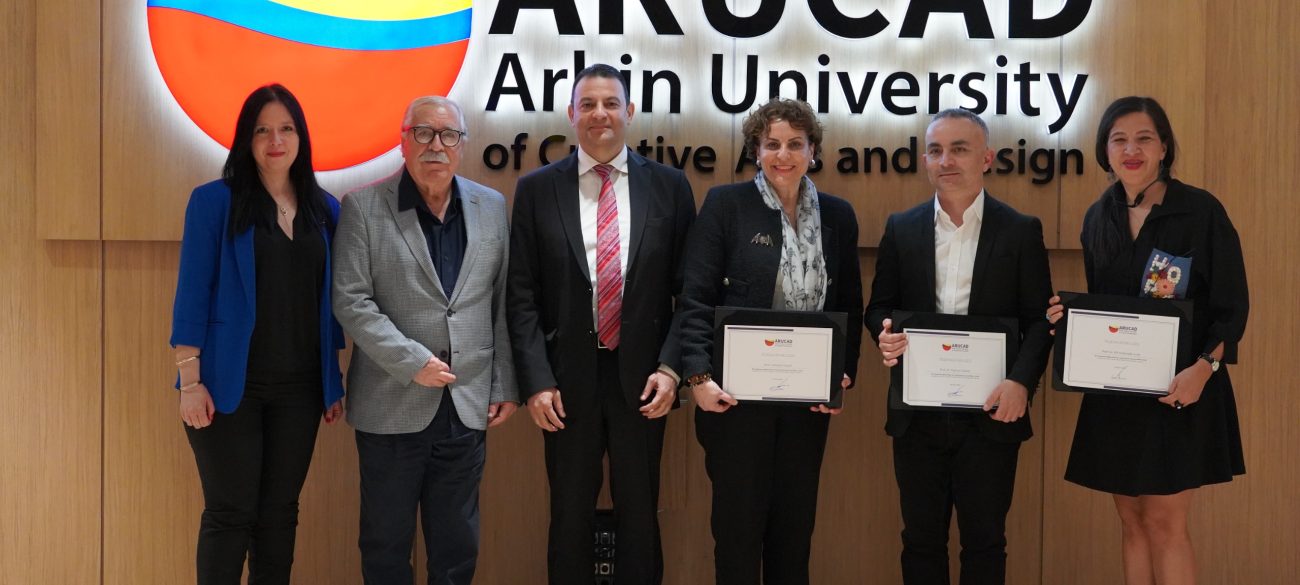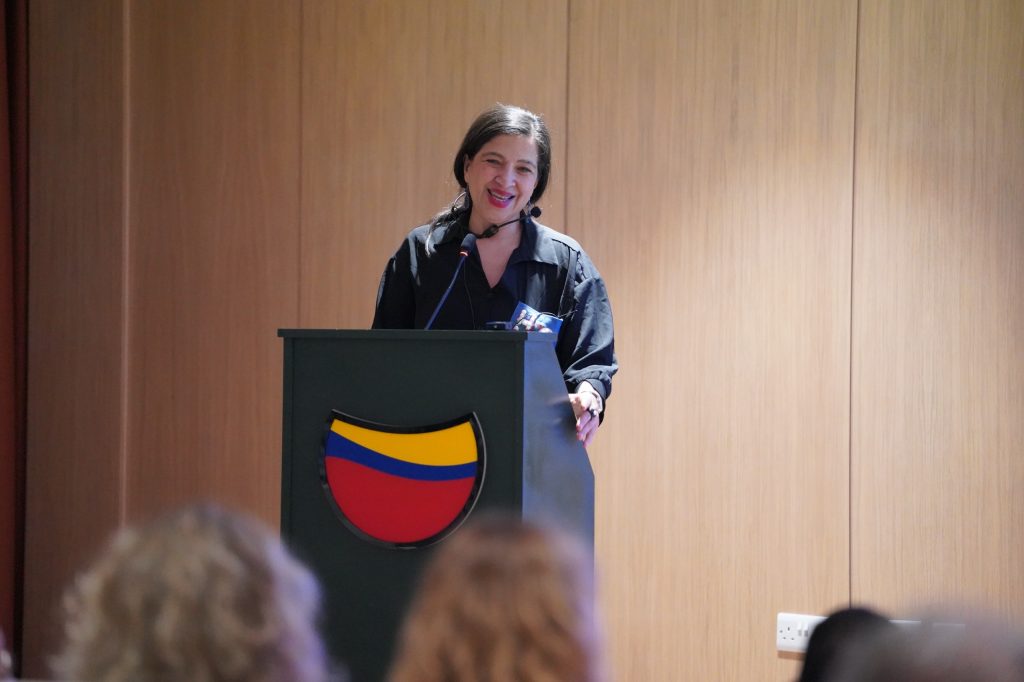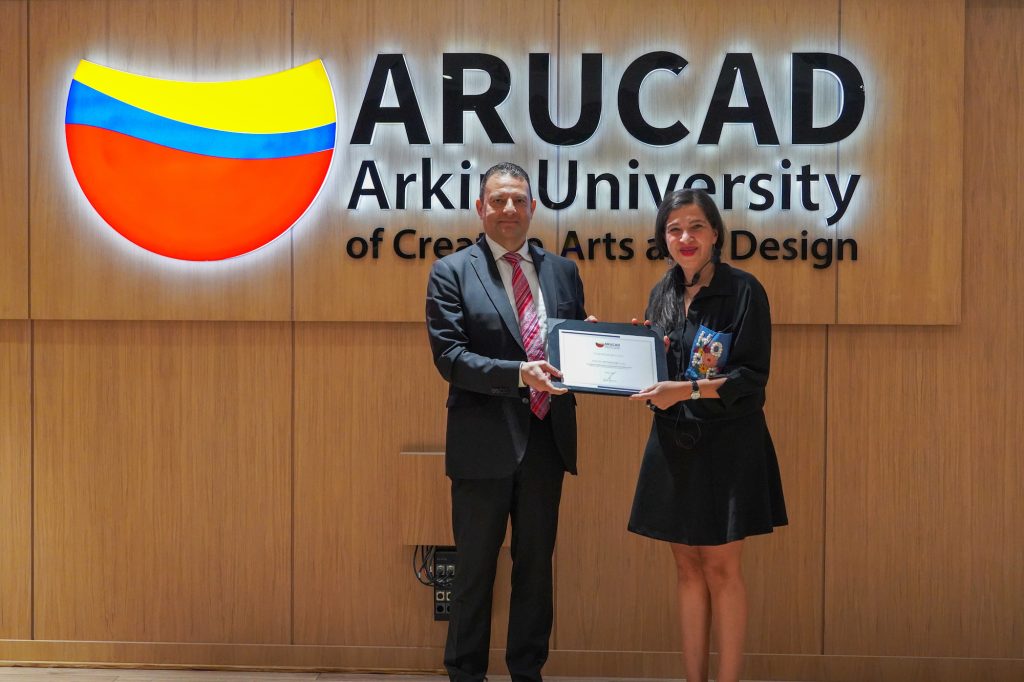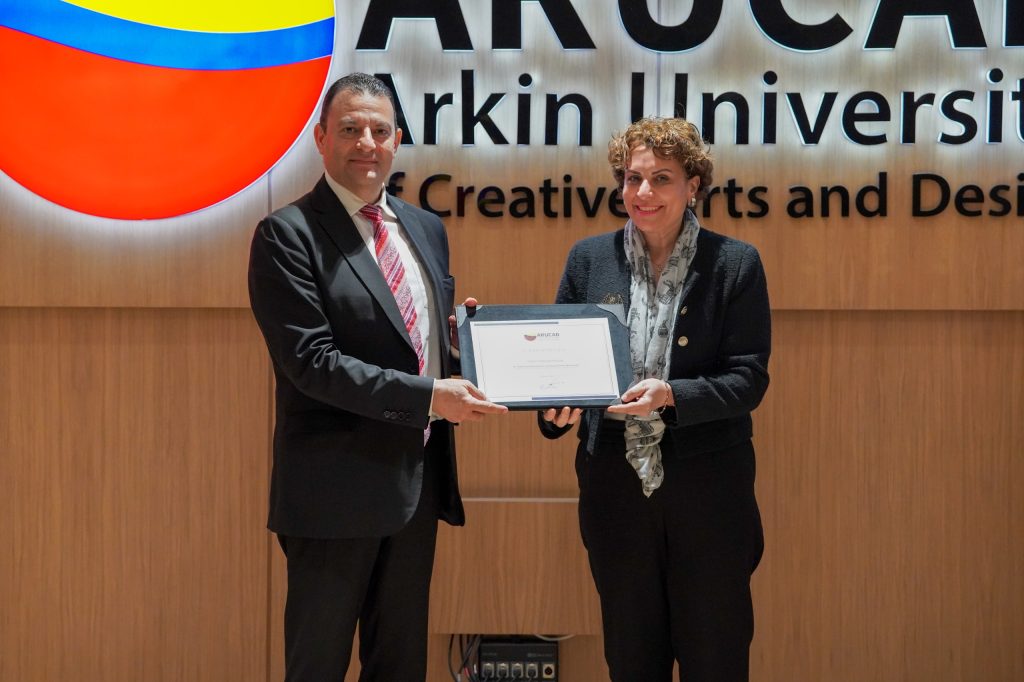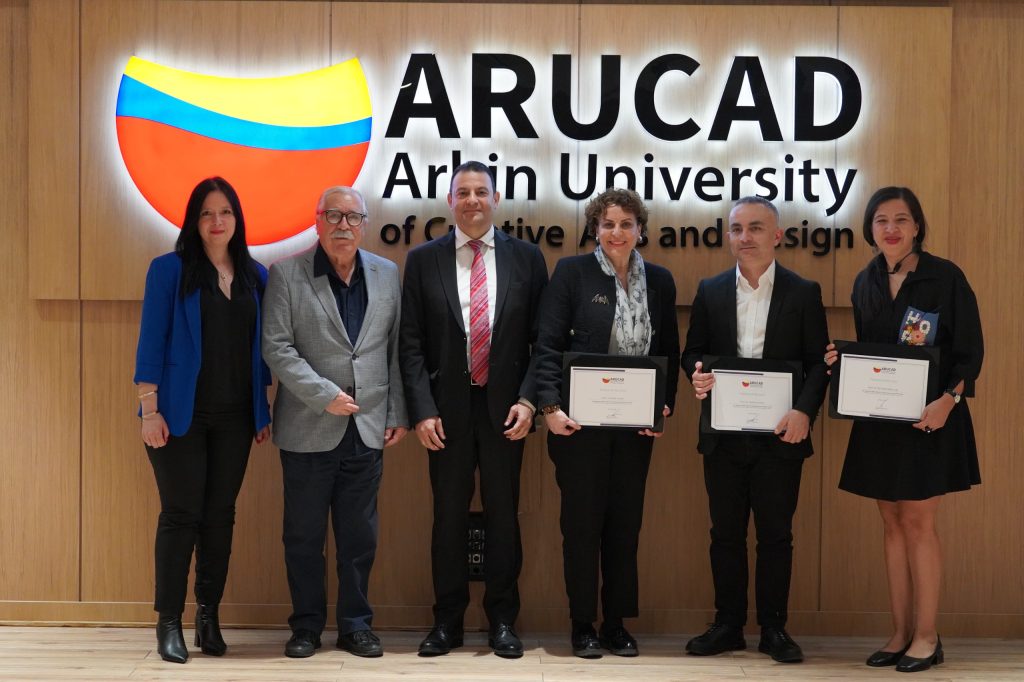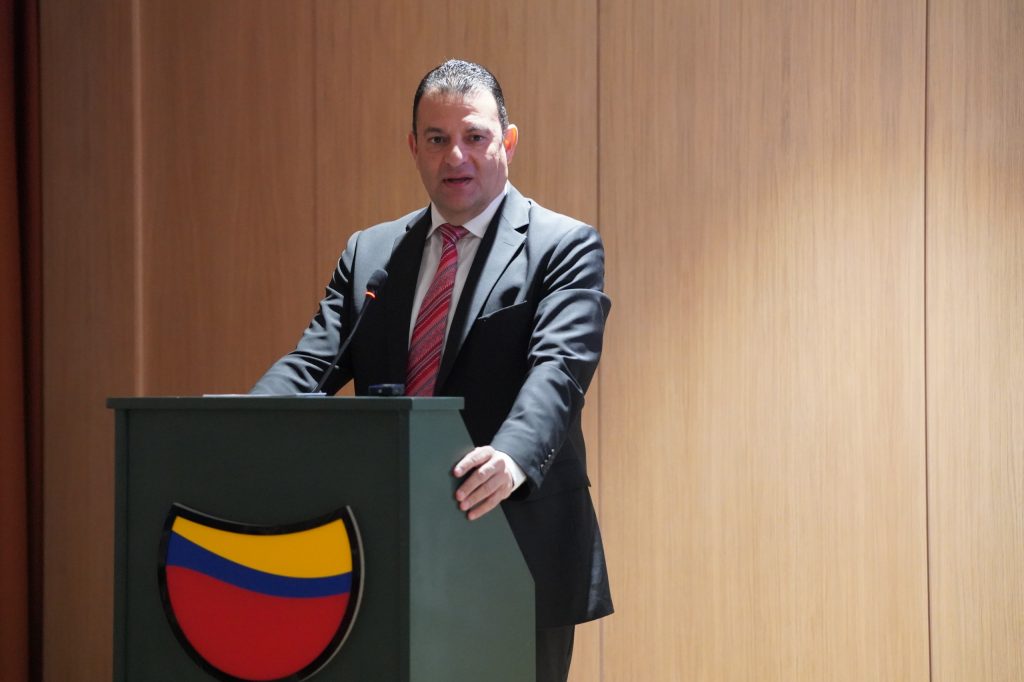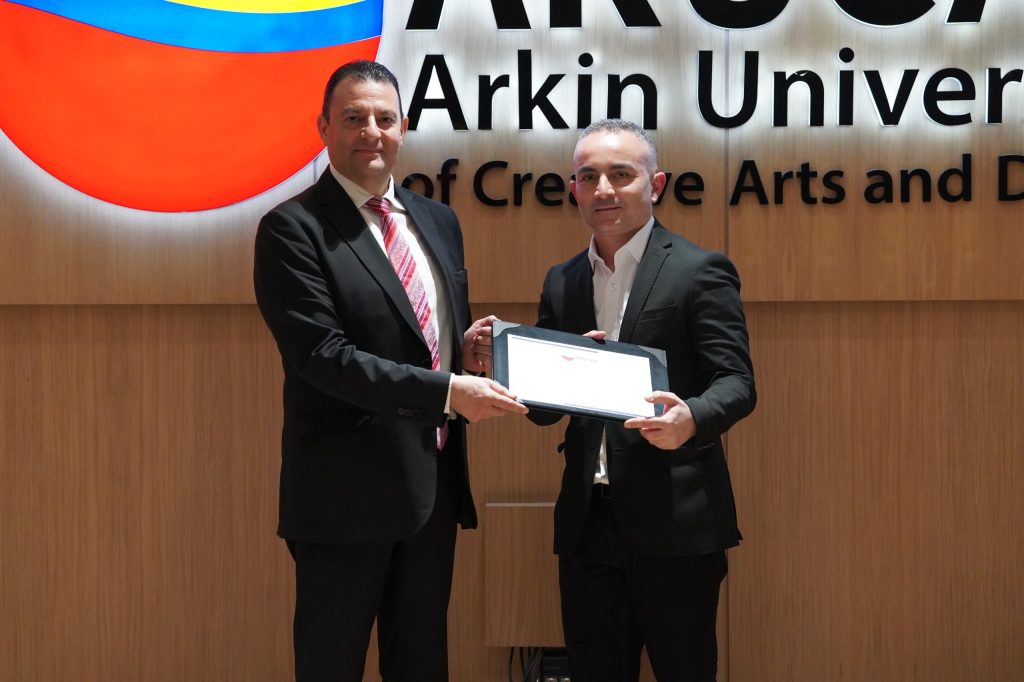Arkin University of Creative Arts and Design (ARUCAD) hosted a meaningful seminar that brought together art and medicine. The seminar, titled "Healing Bowls Dedicated to Dr. Fazıl Küçük, the Remedy of a Society," took place on Friday, March 28, 2025, in the Conference Hall. It was presented by Prof. Dr. Elif Vatanoğlu Lutz, the founder of the Oxytocin Medicine and Art Platform and a faculty member at Yeditepe University Faculty of Medicine. The seminar was part of the closing event of the Cyprus Turkish Medical Association’s March 14th Medicine Day program.
Among the attendees were ARUCAD Rector Prof. Dr. Asım Vehbi, Chairman of the Board of Trustees of the Dr. Fazıl Küçük Foundation Mehmet Küçük, Board Member Selen Süheyla Küçük, President of the Cyprus Turkish Medical Association Prof. Dr. Ceyhun Dalkan, along with academics, students, and healthcare professionals.
Speaking at the seminar, Dr. Fazıl Küçük Foundation Board Member Selen Süheyla Küçük emphasized: “Healing is not just about curing illnesses; it is also about fostering hope. The ability to heal is invaluable. On this occasion, I extend my best wishes to all doctors on March 14th Medicine Day. My grandfather, Dr. Fazıl Küçük, returned to Cyprus after completing his education and dedicated himself to providing free medical services and leadership to the people. During the events of 1963, he opened his home to the people, becoming their remedy. He gave to the people without expecting anything in return. It is crucial that the values he represented continue to be passed down to future generations. Therefore, I hope events like this continue to increase, and I sincerely thank ARUCAD for organizing this valuable seminar.”
The President of the Cyprus Turkish Medical Association, Prof. Dr. Ceyhun Dalkan, also shared his thoughts: “Today, we are here to commemorate Dr. Küçük. He was a man who dedicated himself to the Turkish Cypriot people despite countless hardships. He believed that no one should be turned away due to financial difficulties. He personally procured medicines and traveled from village to village, providing healing to the people. His struggle was not only against diseases but also against ignorance. With his words, ‘If a society is plunged into darkness, its future will also be diseased. The poison of bigotry is more lethal than the venom of a viper,’ he highlighted the importance of intellectual well-being. Today, as we remember him, we see that his light continues to illuminate the conscience of the Turkish Cypriot people.”
ARUCAD Rector Prof. Dr. Asım Vehbi expressed his pride in hosting the event: “Today, we are honored to host an event that brings together art, medicine, and our leader, Dr. Fazıl Küçük. It is a great privilege for us to welcome Prof. Dr. Elif Vatanoğlu Lutz, a Gusi Peace Prize laureate. As the ARUCAD family, it is incredibly meaningful to explore Dr. Küçük’s contributions to public health through art. In this event, we will witness how art and medicine complement and support each other. Moreover, I would like to take this opportunity to extend my best wishes to all doctors on March 14th Medicine Day. I also learned today that a group of doctors organized an art exhibition this year, and I hope that next year we can host this exhibition in collaboration with ARUCAD.”
During the seminar, Prof. Dr. Vatanoğlu Lutz shared insights into the work of the Oxytocin Medicine and Art Platform and its "medical humanities" approach. She emphasized that in addition to the technical aspects of modern medicine, ethical, philosophical, and artistic dimensions are indispensable parts of healthcare services. Through various examples, she demonstrated the healing power of art and explored how ancient traditions, such as healing bowls, can be harmonized with contemporary medicine. Her presentation included historical medical illustrations, bio-art works, and modern art pieces, addressing themes of the human body, illness, and recovery. She highlighted that Dr. Fazıl Küçük was not only a physician but also a leader of society and stressed the importance of conveying this multifaceted identity to younger generations through art. The seminar evolved into a compelling narrative that reminded attendees of the deep connection between medicine, humanity, and art.
In her presentation, Prof. Dr. Vatanoğlu Lutz introduced 12 healing bowls she designed, explaining how they symbolize Dr. Fazıl Küçük’s leadership, the concept of healing, and the intersection of medicine and art. She also shared the founding story of the Oxytocin Platform, stating that medical students start their education with both logical and creative thinking skills, but rigid, memorization-based education systems often diminish this creativity over time. This realization led her to establish the Oxytocin Platform.
Lutz also discussed her online seminars during the pandemic, in which she explored how the oxytocin hormone could be linked to social issues such as racism. She noted that these studies contributed to her becoming the first Turkish woman to receive the Gusi Peace Prize.
Detailing the design process of the healing bowls, Lutz elaborated on their transformative and therapeutic effects. She also warned against unscientific alternative medicine practices, illustrating how they can become a public health threat when they stray too far from scientific foundations. She emphasized that alternative medicine should, like healing bowls, remain on shelves as art pieces rather than being treated as legitimate medical treatments.
The seminar, which united the concepts of art, medicine, and leadership, provided attendees with a profound intellectual and emotional experience. With a large and diverse audience, the event was followed with great interest by professionals in the fields of healthcare and art, as well as students and members of the wider community.



